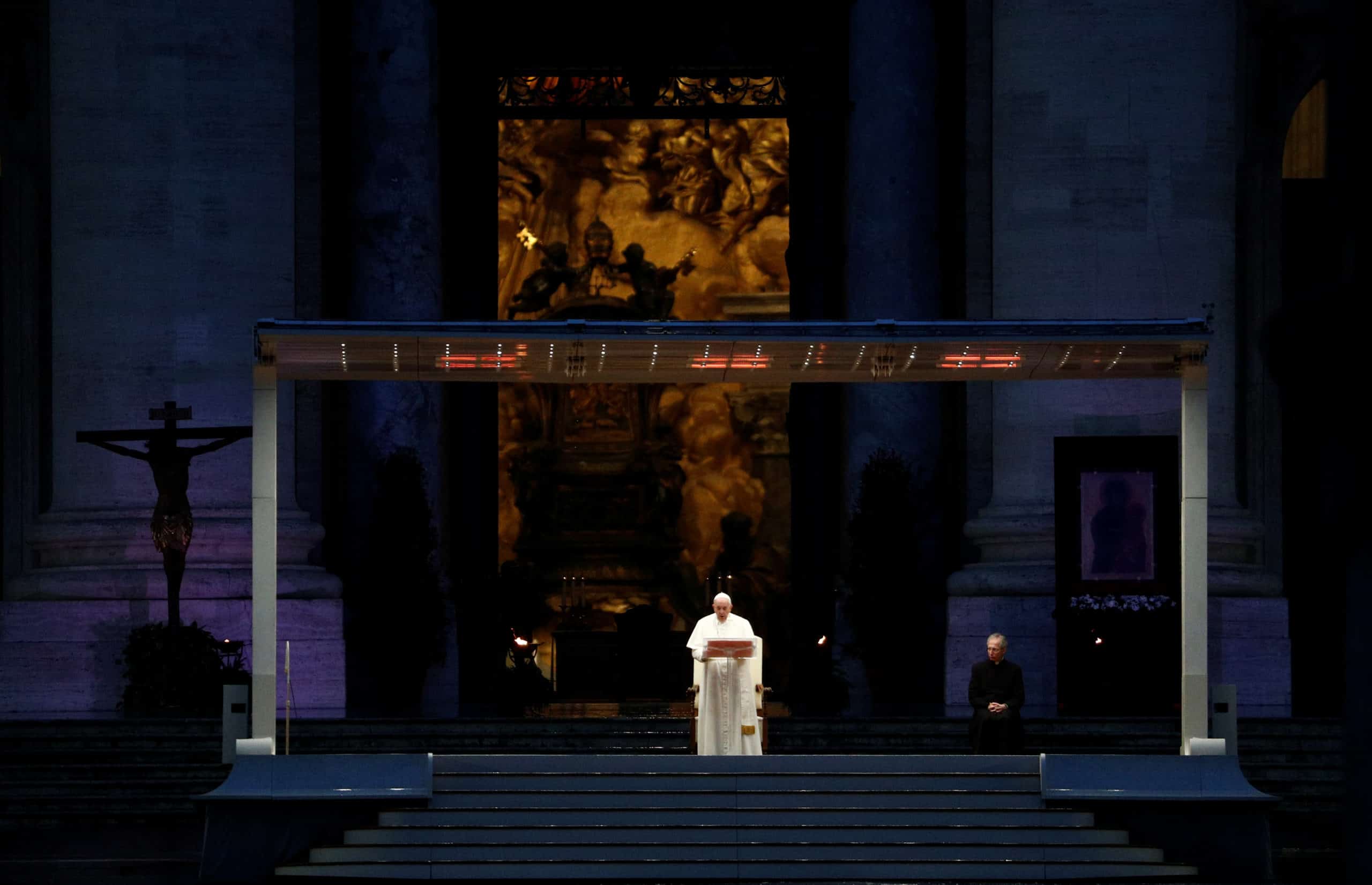“I can’t but help think God is punishing us,” my 87-year old great aunt from Rhode Island recently said to me over the phone. I was listening to her thick New England accent as we discussed a world shaken and upended by the Coronavirus. She then reminded me that in 10 minutes we would need to hang up because Pope Francis had made a request to the world to join him in praying the rosary that day at 4pm.
When we later continued our conversation, she referenced lines from the Old Testament where God smites the people of Israel because they turned away from Him and floundered in their commitment to Him. I responded by explaining theologically: sin, disaster, and death are a result of fallen human nature, while at the same time emphasizing that God is still here loving us. However, that response did not feel satisfying. It didn’t entirely address her concerns.
I empathize with how the “punishment explanation” can seem to align more intuitively with the current picture of the world: spike in global mortality rates; global economic distress; loneliness of social distancing; anxiety and uncertainty about future; dread; news headlines of impending doom; and the sudden disruption in plans, dreams, and careers. Although I still trust that God isn’t punishing the human race, I couldn’t quite articulate why.
After listening to and reading Pope Francis’ meditation on the calming of a storm at sea in the Gospel of Mark during his Urbi et Orbi blessing, I found a response more satisfying than what I could provide:
Lord you are calling to us, calling us to faith. Which is not so much believing that you exist, but coming to you and trusting in you. This Lent your call reverberates urgently: “be converted!” “Return to me with all your heart” (Joel 2:12) You are calling on us to seize this time of trial as a time of choosing. It is not the time of your judgment, but of our judgment: a time to choose what matters and what passes away, a time to separate what is necessary from what is not. It is a time to get our lives back on track with regard to you, Lord, and to others.
Pope Francis directs us away from the question “Are you punishing us and letting us perish?” to this question: “In this moment of my faith journey on Earth, how will I draw closer to God?” My initial response to the “punishment explanation” was to intellectualize our reality. In contrast, Pope Francis doesn’t choose to rationalize the pandemic. He instead looks at the pandemic with the eyes of faith, seeing it as an opportunity for conversion. Pope Francis extols us to ask for the grace to trust in God, so that we might be like Jesus, who by being in the stern is closest to the storm, yet he’s asleep, confident and assured of God’s immense care and love.
Pope Francis’ response also aligned with what I had been re-reading in Victor Frankl’s seminal work: Man’s Search for Meaning:
What was really needed was a fundamental change in our attitude toward life. We had to learn ourselves and, furthermore, we had to teach the despairing men that it did not really matter what we expected from life, but rather what life expected from us. We needed to stop asking about the meaning of life, and instead to think of ourselves as those who were being questioned by life – daily and hourly. Our answer must consist, not in talk and meditation, but in right action and in right conduct. Life ultimately means taking the responsibility to find the right answer to its problems and to fulfill the tasks which it constantly sets for each individual.
The pandemic has disturbed my implicit expectations on life: good health, safety, in person classes, ministry at an elementary school, summer plans involving international travel and Spanish acquisition, etc. Yet Francis and Frankl remind me that I need an attitude change. It doesn’t matter what I expect, I cannot control global disease spread. But I can control how I respond to the crisis.
When thinking about being questioned by life, I’m left pondering the example of Mary. The young girl, betrothed to Joseph, with a simple life ahead of her faced a radical decision: stay the course or give birth to the son of God. She chooses to abandon her implicit expectations on life and courageously accepts God’s will. Her response mirrors the response of Jesus in the stern of the boat during the storm: trust in God even in the midst of turmoil, chaos, and uncertainty.
The poet Denise Levertov writes how we now face our own annunciation moments:
Aren’t there annunciations
of one sort or another in most lives?
Some unwillingly undertake great destinies,
enact them in sullen pride,
uncomprehending.More often those moments
when roads of light and storm
open from darkness in a man or woman,
are turned away from
in dread, in a wave of weakness, in despair
and with relief.
The pandemic approaches us not as a punishment but as an annunciation, a moment when “roads of light and storm open from darkness.” The pandemic has opened within us roads tangled with uncertainty and fear but also hope and potentiality. Levertov helps us face the pandemic by imploring us to ask this question: what personal destiny has been announced to me by the pandemic? If we ignore or avoid the question we then desperately grip the edge of the boat, simply waiting for the storm to end. But if we answer the question, and act on the question, we enter the stern of the boat and imitate Christ.


